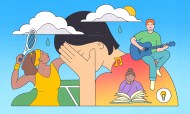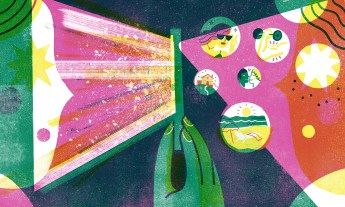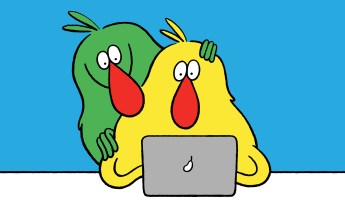
Ever wish you had go-to experts that you could tap for advice in all the varied areas of your life — your job, your home, your finances, even your emotions? TED has got you covered!
In our How to Be a Better Human podcast, host Chris Duffy speaks to an exciting mix of world-class researchers, thinkers and doers (read on to find out more!) and learns actionable takeaways that we can all use to improve our days and nights. Read on to learn the advice that he’s personally found the most helpful, and listen to episodes here.
As host of TED’s How to Be a Better Human podcast, I’ve found that one of the most common reactions people have upon hearing about the show is to ask me: “What have you learned from it? And how can I become a better human?”
Well, actually, that’s sugarcoating it a bit. If I’m honest, what really happens when people learn about the show is they raise their eyebrows and look me over, seemingly thinking: “Who the heck are you, podcast boy, to think you can tell us about becoming a better human?”
That’s why I almost always quickly add, “I’m not the better human of the title! The better humans are the guests, and I’m just a regular person trying to understand their ideas.”
That being said, over two seasons and 62 episodes featuring interviews with a fascinating and diverse group of people — including a sleep researcher, a Native American chef, a data journalist and an award-winning Broadway set designer — even a lug like me has picked up some insights.
Here are the pieces of advice that have stuck in my brain and that I’ve tried to apply in my own life:
1. Improve your relationship — by getting into a love triangle
George Blair-West MD is an Australian relationship expert, researcher and psychiatrist, and he’s been married for 34 years. He told me that the key to a long-lasting relationship of any kind is getting into a love triangle — unfortunately, not the kind you see on a telenovela.
No, what George meant by triangle is taking the same three steps over and over in your relationship.
Step one: You have to trust that when you share something vulnerable with your partner, they will respect your trust and not use it against you.
Step two: You test that trust by sharing something with them that you’re anxious about people knowing about you.
And step three: You keep building intimacy as you do this over and over and realize that your partner will still care about you, despite your shortcomings.
OK, it might not seem as spicy as the other kind of love triangle — but secrets, hidden weaknesses and building a deep, meaningful, passionate love? It’s still pretty good!
George’s advice is something that I think about a lot. Every time I’m afraid to have a conversation with my wife or admit how I’m really feeling to her, I remember George’s point that this is the whole thing! The best way to make your relationship deeper and stronger is by letting yourself be human, admitting the things you’re ashamed of and saying them out loud to your partner. Because when you say them and the other person loves you anyway? Ooh, baby! That’s the good stuff.
Go here to listen to the episode
2. You are bigger than your job
Greta Morgan is a writer and musician whose musical projects include Vampire Weekend, Springtime Carnivore and Gold Motel. She’s toured the world and played in front of huge venues full of adoring fans.
But then one day, she was diagnosed with a vocal disorder — one that took away her ability to sing. Suddenly, her ideas about what her life and her career would look like shifted dramatically.
So what would you do if the thing that defined you disappeared overnight? So many of us have melded our identities with our work, and in the process, we often forget who we really are. When I spoke to Greta, she made such a compelling case for how being forced to redefine herself ended up expanding her understanding of her creativity and resilience.
I’ve similarly struggled with tying my self-worth to my output and my career. Greta offered me a reminder that if we can let go of holding onto our ideas of who we are “supposed to be,” we will allow ourselves to grow and to discover our deeper, more authentic selves.
For me, that means valuing creative work I make and enjoy personally even if it doesn’t sell or make any money. And it means me being open to trying new things, even if they don’t necessarily fit under the umbrella of “comedy,” like writing a blog post for TED about how to be a better human.
Go here to listen to the episode
3. Never be afraid to make trouble
I have never identified with a joke more than when I heard comedian John Mulaney say: “You could pour hot soup on my lap, and I’ll probably apologize to you.”
I hate conflict, and I never want to make a fuss or create an uncomfortable situation. But my conversation with Luvvie Ajayi Jones convinced me this is actually not a trait to be proud of. Instead, standing up against the tide is a muscle I need to develop and grow instead.
Luvvie self-describes herself as a “professional troublemaker.” She says that if we really want to improve the world and tackle the big, important issues, meekly following the rules is not going to cut it. Talking to her completely reframed the idea of “trouble” for me, prompting me to think of it as a necessary step on the path to improvement rather than as a sign that I was being difficult or not a team player. So now I’m trying to assert myself whenever I feel a twinge of “That’s not right.”
A friend makes a problematic joke? Maybe I can have a conversation with them about it and not just laugh awkwardly.
There’s a person on the street who seems lost or confused? Maybe I can check in rather than assuming that they’d ask if they needed help. (Even typing this one makes me a little nervous since I’m imagining an older man yelling at me that he’s not confused or lost and how dare I insinuate he was!)
But I want to tackle these small scale, lower-stakes moments so I can get more comfortable with being uncomfortable. That way, when the big stuff happens, I’ll have the troublemaking muscles to do what needs to be done. I certainly wouldn’t say I’m a professional troublemaker yet, but maybe I’m an aspiring amateur.
Go here to listen to the episode
4. Be the best at having terrible ideas
Frans Johansson has spent his career studying innovation and what makes some ideas truly groundbreaking. One of the things that he’s discovered is it’s easy to find support for your ideas if you’re only making incremental changes.
Let’s say it’s 1970, and you’re working on making home telephones 10 percent more efficient. Everyone at the phone company would have been likely to get on board. But if you told them you were working on an idea to make phones that could work outdoors and without any wires, you’d likely be out in the cold. And yet, looking back, we can see clearly which idea was more valuable.
I’ve been trying to embrace that idea more in my own life — to take bigger swings. Frans says if you want to come up with novel solutions, you have to discard the first few things that come to mind, the obvious answers.
Try something bizarre! It might not work, but as Frans says, “The single most important factor is that you are interrupting your default thought.” Plus, when I set my goal as simply “come up with some terrible ideas” I immediately feel better, because I am so good at having bad ideas. In fact, I’ve decided it’s my specialty.
Go here to listen to the episode
5. Be a better talker — by shutting up
I talk for a living, whether it’s hosting this podcast, doing standup or pitching jokes for a TV show. But still, one of the times I’ve been most terrified when doing this podcast was when I was interviewing Celeste Headlee. She’s an award-winning journalist who has done everything from anchor morning news on public radio to covering presidential campaigns. She’s an expert on great conversations. So the pressure was high to have our conversation be… not terrible, you know?
Luckily, Celeste made my job easy and offered plenty of practical tips including how to pick one conversational skill to work on at a time. This small step can dramatically improve your relationships and your outcomes at work. For me, I’m working on shutting up more and, as Celeste puts it, “not equating talking with conversing.” Because if you want to have a great conversation, it’s not about following any tips and tricks for “seeming engaged” in the conversation – you have to actually be engaged. So I will now shut up.
Go here to listen to the episode
6. And if all else fails, try being perfect
Michael Schur is the comedy writer behind so many of my favorite TV shows, like Saturday Night Live, The Office, Parks and Recreation, The Good Place. (And, very occasionally in front of the scenes, like when he played Dwight’s terrifying cousin Mose in The Office). But Michael’s true passion isn’t jokes; it’s moral philosophy.
In our episode, Michael talked to me about why he’s obsessed with chasing after the eternal, perhaps unanswerable question of “how to be perfect” and why he believes caring about ethics — on any level — can actually make a difference. Whether it’s deciding which brand of environmentally friendly toilet paper I should buy (or should I actually just switch over to an electronic bidet), agonizing over if it’s OK to listen to music made by a terrible person, or deciding if it’s OK to lie in a list of ways to become a better person, I’m comforted by Michael’s reminder that people have been struggling over these questions for thousands of years. (Maybe not these exact questions, I don’t think electronic bidets existed until recently.)
He argues that the right thing to do is engage with the questions rather than ignore them and try to find a moral framework that we can stand by and stick to. I’m not there yet, but I’m thinking more deeply about the ethical quandaries inevitably posed by every decision I make (and I decided I’m just not ready for a bidet quite yet. Maybe next year …)
Go here to listen to the episode
Enjoyed this article? The advice doesn’t end here — we’re just getting started with new weekly episodes of How to Be a Better Human throughout the year. Give it a listen to receive more delicious, useful bites of insight that can help you in all parts of your life here.
Watch this special TED Membership conversation with Luvvie Ajayi Jones now:











